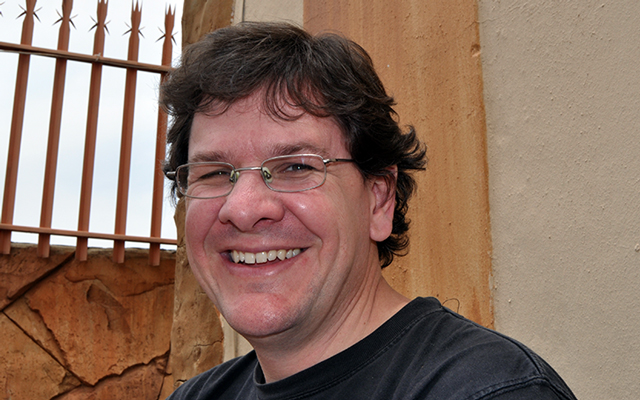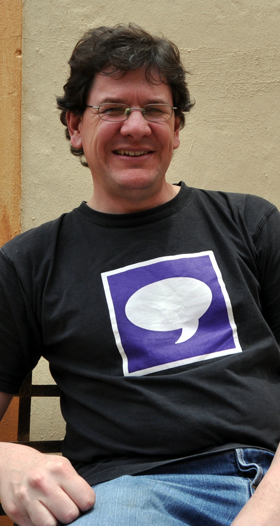
In Douglas Adams’s The Hitchhiker’s Guide to the Galaxy, alien species from across the universe communicate using a “small, yellow, leech-like” animal called the Babel fish, which “feeds on brain-wave energy, absorbing all unconscious frequencies and then excreting telepathically a matrix formed from the conscious frequencies and nerve signals picked up from the speech centres of the brain”.
“The practical upshot,” according to the book, is that “if you stick one in your ear, you can instantly understand anything said to you in any form of language”.
Pretoria-based software developer and translation expert Dwayne Bailey isn’t attempting to replicate anything as complex as Adams’s Babel fish, but his work on translating software into African languages is having plenty of impact down here on planet Earth. His work is helping non-English speakers across South Africa use software in their own languages — removing a key barrier to bridging the digital divide.
Bailey started the nonprofit Translate.org.za in 2001 as a way of trying to promote free and open-source software such as the OpenOffice.org productivity suite and the Mozilla Firefox Web browser. “I saw a link between the need for African languages on computers and wondered why someone would have to learn English to use a computer,” he says. Five years ago, Translate completed work on providing OpenOffice in North Sotho, Zulu and Afrikaans, making it the first major piece of software to be translated into those languages.
Bailey says the translation work on OpenOffice acted as a catalyst for Microsoft to develop its products in local languages. “Within three weeks of the launch of the OpenOffice translations, Microsoft said it would translate Office.”
Today, the organisation’s translation work is included in the popular LibreOffice, an office suite used by millions of people around the world.
Translate.org.za’s focus hasn’t been on open-source software exclusively, though. The organisation has built local-language spell checkers and has developed fonts for Venda. It’s even translated calendars to reflect South Africa’s public holidays.

In 2008, Translate received a large grant from the International Development Research Centre, a Canadian agency, to lead and manage a new network called the African Network for Localisation, or Anloc, which gave the organisation exposure to, and resulted in it working with, a much bigger community of translation and localisation experts and volunteers.
Today, Bailey is keen for Translate.org.za and the wider community to contribute African local-language support to the Firefox OS, the upcoming smartphone operating system being developed under the Mozilla umbrella. If Mozilla is going to be successful in reaching the next 2bn smartphone users, it will need to provide local-language support, Bailey says.
He admits that when he first got into translation work, it was because of his passion to spread open-source software to as wide an audience as possible. He worked at the time for Obsidian Systems, the country’s largest open-source software house. “It turned into an advocacy thing.”
Later, though, he realised it was necessary so that non-English speakers could capture history without impediments and so that people who struggled to learn in English wouldn’t face a barrier. “If you’re studying in a Xhosa school, why should you be English literate? It became a bit of a rights issue for me.”
Bailey studied mechanical engineering at technikon and, after graduating, went to work at Koeberg, the nuclear power station outside Cape Town. “One week into that job, I became very depressed about the idea of being a mechanical engineer for the rest of my life.”
He soon found himself drawn into the world of computers, and specifically one computer: a Unix-powered nuclear power plant control room simulator. That exposed Bailey to Unix — and a bit of Linux — and he decided change careers. He enrolled for a Business Science degree, majoring in information systems.
By the time he completed university, his passion for open source was evident. He started a company called Linux Warehouse, which sold Linux software to enthusiasts — this was before broadband took off — and eventually folded the business into Obsidian. Translate was a side project he worked on in his spare time, but when he received funding from Mark Shuttleworth’s foundation and from government, he eventually decided to focus on it as a full-time job.
He admits it’s been a tough job, and that the organisation has at times struggled to build sustainable income. He says it plans to focus more on growing recurring income from “people who care about our work and who use our products”.
With his heritage in open-source software, Bailey is a little coy to admit, when I ask him what operating system he uses, that he has moved to Apple as his primary computing platform.
“I bought a MacBook Air,” he says a little sheepishly. “No one ever made a laptop that was light enough for all the travelling I do. I bought the Air because it’s the form factor I always wanted.”
He’s quick to point out, though, that he still runs Linux in a virtual machine on top of Apple’s Mac OS X operating system. And all of the applications he runs, from his e-mail program to his word processor, remain of the open-source variety.
Bailey must be hoping that if anyone ever does develop something that resembles the Babel fish, it, too, will not be released under a proprietary licence. — (c) 2013 NewsCentral Media




